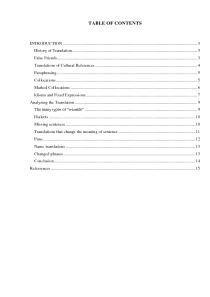The Peculiarities Of Translation Of „Harry Potter And The Prisoner Of Azkaban” By J. K. Rowling



Introduction. History of Translation. False Friends. Translations of Cultural References. Paraphrasing. Collocations. Marked Collocations. Idioms and Fixed Expressions. Analyzing the Translation. The many types of “Wizards”. Dialects. Missing sentences. Translations that change the meaning of sentence. Puns. Name translations. Changed phrases. Conclusion. Referrences.
In a way, those meanings are similar. Both are means of “preserving” something. In English language, preservatives are used to “preserve” food from spoiling while condom is used to “preserve” a sperm inside it to prevent pregnancy or diseases.
Eirlys Davies (2003;77) writes about an interesting example in the French version of Harry Potter and the Philosopher’s Stone by Jean Francois-Menard. In the book, author expects us to know what is “prefect”, since it is an actual type of student in English schools. Most translations (including Lithuanian) simply explained this in the footnotes, while French translation has inserted a new paragraph instead. Davies provides a back-translation for the paragraph.
Such strategy is typical while translating culture specific items and modern words. Explaining the loan word in a text is useful when the word is repeated multiple times later. After explaining once, readers can understand the word later and not be bothered by it anymore.
Cream Tea was mentioned and translated to German in a Patrick Collection leaflet, a private owned motor museum leaflet.
German translation: ... vom anspruchvollen Feinschmecker bin zum ‘Cream-Tea’-Experten. (...from demanding gourmets to ‘Cream-Tea’-Experts) (Baker, 2011)
While Germans have a similar custom of coffee and cakes, the translator assumed that German speakers who visit the museum would be educated and know of the British custom Cream Tea. Also in German language it is custom to merge words. Merging Tea and Experts might confuse German readers, while merging Cream and Tea would conflict with original English usage. The usage of hyphens seems like a compromise between two languages.
In French language, the text was translated as – de la gourmande au Salon de Thé à l’anglaise. (From the gourmet table to English style tea salon). (Baker, 2011)
Paraphrasing is good when there is a need to specify the propositional meaning. The disadvantage of this is that it takes a lot of space, several items for one word. In some places, like subtitling or advertising it cannot be used because it takes too much space. Paraphrasing cannot be used for movie or book titles that have to be snappy and sharp. While explaining it would keep the complete meaning of words that do not exist in target languages, it would render the title unattractive.
While German translation nicely unwraps the “alfresco”, it lacks the snappiness, which, inevitably, was lost in translation.
In different languages, connotations can be different. For example, in English, they deliver a lot of nouns, while in Arabic they use a different verb each time. The dictionary equivalent of deliver is yusallim.
- Languages Individual works
- Microsoft Word 42 KB
- 2018 m.
- English
- 15 pages (4461 words)
- University
- Aistė

















